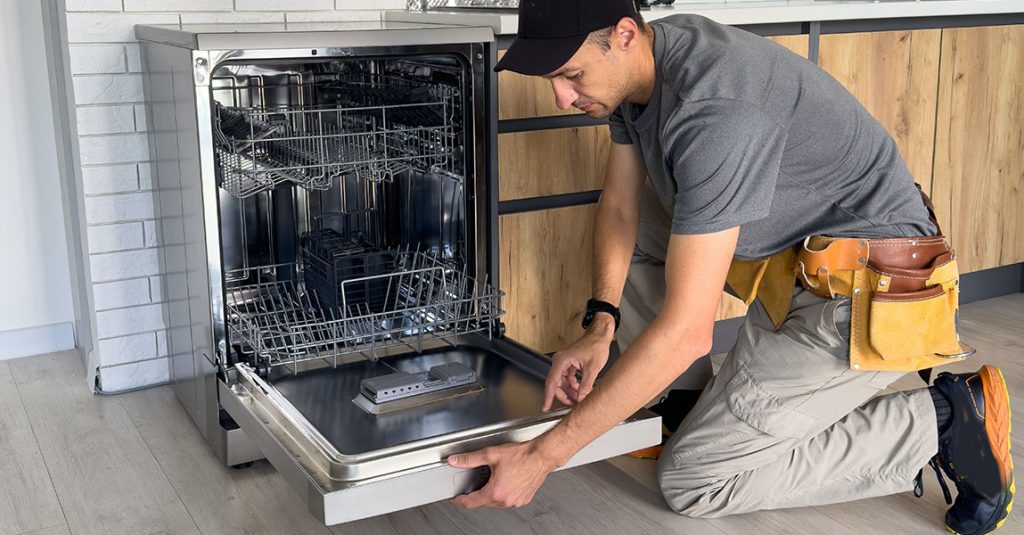If you open your dishwasher after a cycle and get hit with a nasty smell, you’re not alone. We’ve helped a lot of people deal with this exact issue, and it’s almost always caused by something simple that can be fixed. In this post, we’ll walk through the most common causes, what you can do about them, and a few things to avoid.
Start With the Filter and Drain
Food particles are the usual culprits behind most bad dishwasher smells. After that final rinse, bits of pasta, meat, and grease often settle into the filter and drain area. Consequently, bacteria start to grow in those warm, wet spots, and that leads to the smell.
We always recommend removing the bottom rack and checking the filter first. Depending on the model, you might have to twist and lift it out. Once it’s out, rinse it under hot water and scrub it gently with dish soap and a soft brush. In other words, treat it like a plate with stuck-on food.
After that, check the drain at the bottom of the dishwasher tub. Use a paper towel to remove any visible debris. Most importantly, make sure nothing is blocking it. If water can’t drain properly, it will sit there and start to rot, especially if food particles are involved.
Use the Right Cycle and Load Properly
We’ve noticed that some people always use the shortest or eco-friendly cycle. These are great for saving energy. However, they may not get greasy plates or food-covered dishes clean enough if the loading is poor or detergent is weak.
Firstly, be sure to scrape dishes before loading. This doesn’t mean pre-washing everything but getting rid of big chunks makes a difference. Secondly, place dishes so that water can reach all surfaces. Stack bowls facing down but not nested. In addition, keep plastic containers away from the heating element if your model has one.
If you still smell something off after cleaning the filter and using the right cycle, run an empty hot wash with a cup of white vinegar placed on the top rack. This helps kill bacteria and clear out grease from hard-to-reach corners.
Inspect the Spray Arms and Gasket
Sometimes, the problem isn’t just in the bottom of the dishwasher. Food can also get lodged in the spray arms. These arms spin and shoot water during the wash, but tiny holes can become clogged over time. Consequently, cleaning performance drops and bits of food linger longer.
Take the spray arms out if possible and flush water through them. You can use a toothpick or a pin to clear each hole. Likewise, check the rubber gasket around the door. This seal can hold moisture and debris that easily goes unnoticed.
Wipe the gasket with a damp cloth and mild detergent. Be thorough but gentle. In the same vein, check the small corners around the door that might catch food splashes. These areas don’t get rinsed during a cycle, so buildup is common.
Try a Dishwasher Cleaner or Baking Soda
Even after cleaning the filter and spray arms, some smells might still remain. That is to say, the interior may need a deeper deodorizing. We often use commercial dishwasher cleaners designed to remove limescale, grease, and bacteria.
If you prefer something natural, sprinkle a cup of baking soda along the bottom of the tub and run a hot cycle. This works to neutralize odors and absorb any remaining smells. For example, if the inside smells musty or like sour milk, baking soda usually helps.
Do this monthly as part of your regular dishwasher care routine. In addition, leave the dishwasher door slightly open after each use. That helps the interior dry faster and reduces the chance of mold or mildew forming.
Check the Drain Hose and Garbage Disposal
If your dishwasher is clean but still smells, the issue might be further back. The drain hose that carries dirty water out of the dishwasher can become partially blocked or kinked. As a result, water doesn’t leave the machine properly and starts to smell stale.
Follow the hose from the back of the dishwasher to where it connects to the sink or garbage disposal. Make sure the hose isn’t kinked or sagging. Ideally, the hose should loop upward before going down to the drain, a method called a high loop. This prevents dirty water from backing up into the tub.
For homes with a garbage disposal, run it with cold water before starting your dishwasher. Old food sitting in the disposal can create a backflow of smell into the dishwasher. That is to say, the odor might not be the dishwasher’s fault at all.
When It’s Time to Call for Help
If you’ve cleaned everything and followed all the steps above, but the smell won’t go away, something deeper may be wrong. A technician can check for clogs, leaks, or issues inside the pump or motor housing. Sometimes, food gets trapped behind parts you can’t remove without tools.
In these cases, we recommend professional service. Issues involving backflow, mold deep inside the machine, or standing water that keeps returning all point to hidden mechanical problems. For those of you searching for dishwasher repair in Leduc, getting a diagnosis from an expert can save time and stop the smell from spreading to your kitchen.
Additionally, serious dishwasher odors can signal more than just dirt. Sometimes electrical issues or worn-out seals allow moisture to pool in ways that create mold. Therefore, even if everything looks clean, the internal workings might be the cause.
Keep Your Dishwasher Smell-Free Moving Forward
We always tell people to treat their dishwasher like any other cleaning appliance. It needs maintenance. Otherwise, the same issues will repeat. That’s why we suggest setting a reminder to clean the filter and run a vinegar or baking soda cycle once a month.
Use high-quality detergent and rinse aid. These products help break down grease and keep water moving freely. Likewise, avoid overloading the machine. When dishes are packed tightly, water and soap can’t circulate, which leads to leftover food and bad smells.
If you’ve had ongoing issues, it may help to schedule annual checkups or cleanings. That way, we can catch drain issues or pump wear early. And for general services like appliance repair in Leduc, it helps to work with professionals who know the ins and outs of dishwashers in every home.
We’re always ready to answer questions and figure out what’s going on. If you’re dealing with smells that won’t go away, Contact us today and get the help you need. We’ll take care of it so you can get back to clean, fresh dishes.
Frequently Asked Questions
Why does my dishwasher smell like rotten eggs?
This usually means there’s trapped food in the filter or drain. The smell comes from bacteria producing sulfur compounds. Cleaning the filter and running a vinegar cycle typically fixes it.
How often should I clean my dishwasher filter?
You should clean it at least once a month. If you use the dishwasher daily or rarely scrape your dishes, you might need to clean it more frequently.
Can a dirty dishwasher make you sick?
In rare cases, yes. Mold, bacteria, and spoiled food can contaminate dishes if the dishwasher is very dirty. Regular cleaning prevents this and keeps your kitchen sanitary.
Is it okay to leave the dishwasher door open after a cycle?
Yes. Leaving the door slightly open helps air out the interior, reducing moisture buildup and preventing mold and mildew growth.
Do commercial dishwasher cleaners really work?
They do. Most contain powerful agents that dissolve limescale, grease, and trapped food particles. They’re especially useful if you live in an area with hard water.

